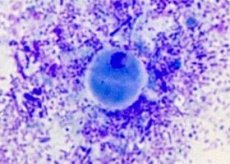Medical expert of the article
New publications
Blastocytosis
Last reviewed: 04.07.2025

All iLive content is medically reviewed or fact checked to ensure as much factual accuracy as possible.
We have strict sourcing guidelines and only link to reputable media sites, academic research institutions and, whenever possible, medically peer reviewed studies. Note that the numbers in parentheses ([1], [2], etc.) are clickable links to these studies.
If you feel that any of our content is inaccurate, out-of-date, or otherwise questionable, please select it and press Ctrl + Enter.

Blastocystosis is an intestinal infection caused by blastocysts (protozoan single-celled parasites). Microorganisms can be part of the intestinal microflora, but under certain conditions they can begin to actively multiply, which will lead to characteristic symptoms of intestinal infection (nausea, diarrhea, etc.).
Causes of blastocytosis
Infection usually occurs through the consumption of unwashed foods (greens, vegetables, fruits, berries), contaminated water (from outdoor water pumps, springs, etc.) or failure to observe personal hygiene (through dirty hands, infected objects, etc.).
When entering the digestive tract, blastocysts penetrate the large intestine, where they begin to actively multiply. During the life of microorganisms, toxins are released that penetrate the blood and poison the body.
The disease can also arise due to disturbances in the functioning of the immune system, which will lead to uncontrolled proliferation of microorganisms.
Symptoms of blastocytosis
The intestines suffer most from parasites, the symptoms of the disease depend on the state of the immune system, mainly diarrhea, abdominal cramps, poor appetite, weight loss, rash and itching on the skin, fever, chills and other manifestations of fever, sometimes vomiting may occur.
Diagnosis of blastocytosis
Clinical manifestations of the disease are not enough to establish a diagnosis.
A laboratory analysis of feces is required (more than 5 blastocysts must be detected to confirm the diagnosis), and the feces must be submitted several times, since the detection of parasites must be repeated.
The stool sample should be delivered to the laboratory as early as possible for a more reliable result.
In some cases, the PCR method is prescribed to diagnose blastocystosis, which detects part of the DNA of parasitic microorganisms, but as with other research methods, multiple detection of parasites is required.
Who to contact?
Treatment of blastocytosis
Blastocystosis can occur without any symptoms, in which case no treatment is required.
If the normal condition is disrupted, allergic reactions occur that do not go away for a long time, and parasites are constantly present in the feces, antiparasitic drugs are prescribed - metronidazole (0.5 g 2 times a day for 5 days), furazolidone (0.1 g 4 times a day for 7-10 days), nimorazole (0.5 g 2 times a day), tinidazole (4 tablets 1 time per day), tiberal (3 tablets 1 time per day), etc.
The treatment complex also includes immunostimulating drugs.
In case of blastocystosis, folk methods of treatment can be used; mainly, such therapy is used as an adjunctive one after consultation with the attending physician.
Blastocysts are highly sensitive to temperature changes and traditional medicine recommends eating more spicy foods (with pepper, ginger, curry, hops-suneli, garlic, mustard, etc.) to create unfavorable conditions in the intestines for parasites.
But this treatment is only possible in the absence of diseases of the digestive system.
Also, blastocysts do not tolerate an acidic environment, so it is recommended to add apple cider vinegar (as a salad dressing), sauerkraut, and sour juices to the diet. However, overuse of such products can lead to problems with the pancreas or gastritis.
To normalize the intestinal microflora, you need to add more fermented milk products to your diet - homemade yogurt, kefir, fermented baked milk, sour milk.
Prevention of blastocytosis
As with other types of intestinal infections, disease prevention includes compliance with sanitary standards and personal hygiene. The main route of infection transmission is dirty hands and food, so you need to wash your hands more often, especially after using the toilet, and greens, fruits, vegetables, berries, do not try products (fruits, berries, etc.) at markets or in stores, drink only purified water, preferably boiled, in rooms, especially in the kitchen, destroy various insects (flies, ants, etc.), wet clean the kitchen and toilet weekly with special disinfectants.
The state of the immune system is of no small importance in preventive measures, since with a strong immune system, parasites have no chance of survival in the body. Therefore, it is recommended to adhere to proper nutrition, lead an active lifestyle and harden yourself.
Prognosis of blastocytosis
When blastocysts are detected in the intestine, if the patient's condition is not disturbed, then the prognosis is favorable in most cases. Blastocysts in small quantities can be present in the intestinal microflora, only their active reproduction and release of toxins into the blood can cause severe allergic reactions and deterioration of health. In this case, after a course of antimicrobial drugs, the condition normalizes, the disease does not give any serious complications.
Blastocystosis only affects patients with a weakened immune system, causing severe symptoms of intestinal infection - fever, vomiting, diarrhea.
The simplest microorganisms that cause the disease - blastocysts - can be detected in a completely healthy person, but do not cause signs of intestinal infection. In this case, the immune system copes with the parasites on its own, and there is no need for additional treatment.
Treatment of this disease is necessary only when severe symptoms of the disease appear or when persistent allergic reactions are provoked by the waste products of blastocysts.


 [
[